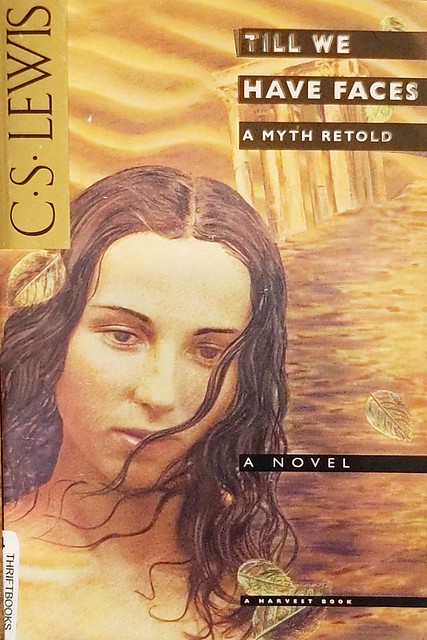 Till We Have Faces: A Myth Retold is a 1956 novel by C. S. Lewis. It is a retelling of Cupid and Psyche, based on its telling in a chapter of The Golden Ass of Apuleius, says wiki. It is set in an imaginary city-state of Glome not too far from the Greeklands; Aphrodite is known as Ungit.
Till We Have Faces: A Myth Retold is a 1956 novel by C. S. Lewis. It is a retelling of Cupid and Psyche, based on its telling in a chapter of The Golden Ass of Apuleius, says wiki. It is set in an imaginary city-state of Glome not too far from the Greeklands; Aphrodite is known as Ungit.Wiki further says Lewis considered this novel to be his best and most accomplished work but I consider that odd. The book is... not very interesting, I think I would say. Not dull; well written; but most of the "interest" is the torment of the central character's relationship to the Gods; which isn't an interest of mine. But was of Lewis's, I believe.
What to say... certain bits are certainly well done. The King has absolute authority to geld a young trouble maker; but must give way before the weight of the local priest and populace when they decide his daughter must be sacrificed. The locals, at least the better-informed ones, are aware that they are on the fringes of the Greeklands... but no I've said that wrong. They aren't "on the fringes" because the Greeklands aren't central. But they know that books come from there, and to some extent culture, that they don't want. The disparity in thinking between the Greeks, who have Philosophy, and the locals, who are rather more earthy. We are drawn to consider the Greek way better; and then at the end, told (somewhat crudely, from the mouth of the dead Greek himself) that it isn't so. That... True Religion is the important part.
The title makes sense at the end: nothing to do, as I half-guessed at the beginning, with female subjection. Instead, it is that we can't meet the gods face-to-face "until we have faces": which is to say, until we can see things truely, without masks. But this conclusion depends on the Gods existing; and they don't.
No comments:
Post a Comment